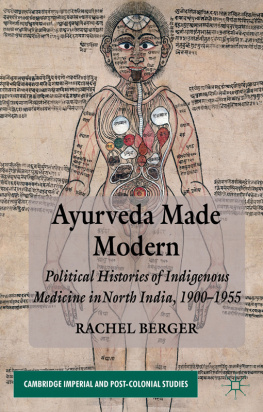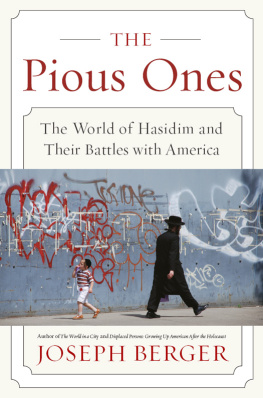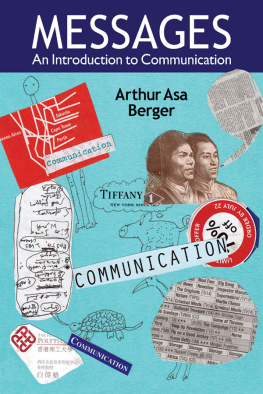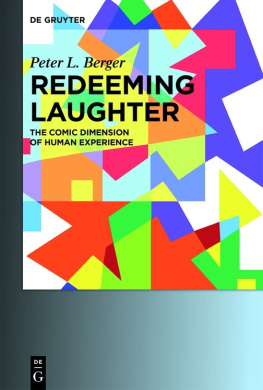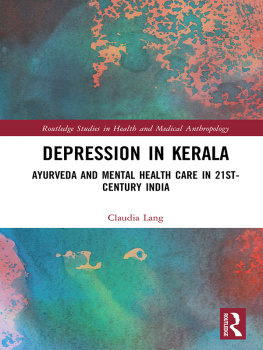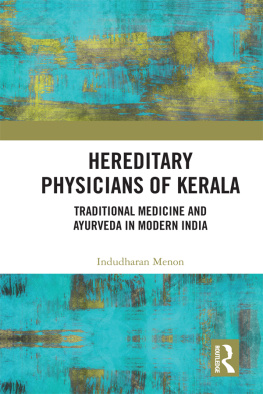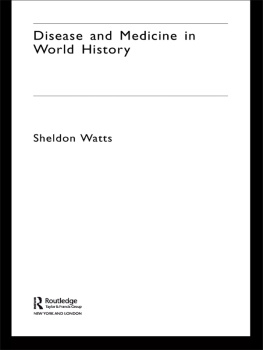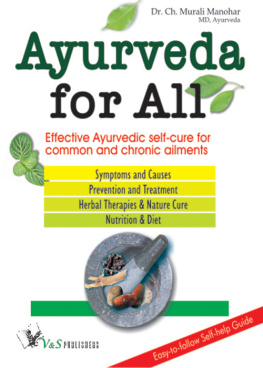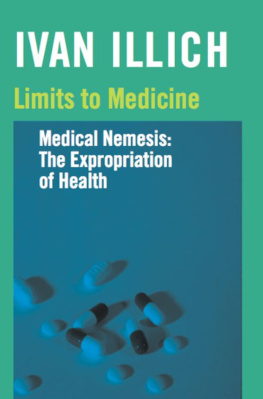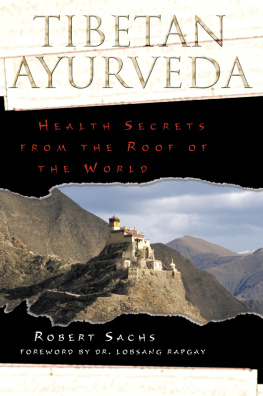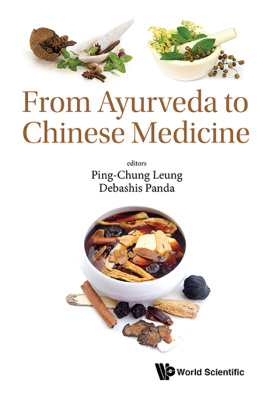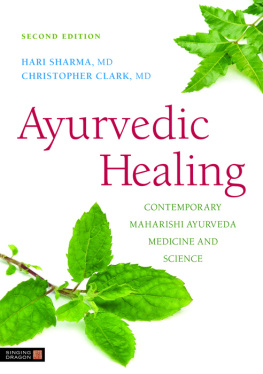Cambridge Imperial and Post-Colonial Studies Series
General Editors: Megan Vaughan, Kings College, Cambridge, and Richard Drayton, Corpus Christi College, Cambridge.
This informative series covers the broad span of modern imperial history while also exploring the recent developments in former colonial states where residues of empire can still be found. The books provide in-depth examinations of empires as competing and complementary power structures encouraging the reader to reconsider their understanding of international and world history during recent centuries.
Titles include:
Tony Ballantyne
ORIENTALISM AND RACE
Aryanism in the British Empire
Peter F. Bang and C.A. Bayly (editors)
TRIBUTARY EMPIRES IN GLOBAL HISTORY
James Beattie
EMPIRE AND ENVIRONMENTAL ANXIETY, 18001920
Health, Aesthetics and Conservation in South Asia and Australasia
Rachel Berger
AYURVEDA MADE MODERN
Political Histories of Indigenous Medicine in North India, 19001955
Robert J. Blyth
THE EMPIRE OF THE RAJ
Eastern Africa and the Middle East, 18581947
Roy Bridges (editor)
IMPERIALISM, DECOLONIZATION AND AFRICA
Studies Presented to John Hargreaves
Kit Candlin
THE LAST CARIBBEAN FRONTIER, 17951815
Hilary M. Carey (editor)
EMPIRES OF RELIGION
Nandini Chatterjee
THE MAKING OF INDIAN SECULARISM
Empire, Law and Christianity, 18301960
Esme Cleall
MISSIONARY DISCOURSE
Negotiating Difference in the British Empire, c. 184095
T.J. Cribb (editor)
IMAGINED COMMONWEALTH
Cambridge Essays on Commonwealth and International Literature in English
Michael S. Dodson
ORIENTALISM, EMPIRE AND NATIONAL CULTURE
India, 17701880
Jost Dlffer and Marc Frey (editors)
ELITES AND DECOLONIZATION IN THE TWENTIETH CENTURY
Bronwen Everill
ABOLITION AND EMPIRE IN SIERRA LEONE AND LIBERIA
Ulrike Hillemann
ASIAN EMPIRE AND BRITISH KNOWLEDGE
China and the Networks of British Imperial Expansion
B.D. Hopkins
THE MAKING OF MODERN AFGHANISTAN
Ronald Hyam
BRITAINS IMPERIAL CENTURY, 18151914: A STUDY OF EMPIRE AND EXPANSION
Third Edition
Iftekhar Iqbal
THE BENGAL DELTA
Ecology, State and Social Change, 18431943
Brian Ireland
THE US MILITARY IN HAWAII
Colonialism, Memory and Resistance
Robin Jeffrey
POLITICS, WOMEN AND WELL-BEING
How Kerala became a Model
Gerold Krozewski
MONEY AND THE END OF EMPIRE
British International Economic Policy and the Colonies, 194758
Javed Majeed
AUTOBIOGRAPHY, TRAVEL AND POST-NATIONAL IDENTITY
Francine McKenzie
REDEFINING THE BONDS OF COMMONWEALTH 19391948
The Politics of Preference
Gabriel Paquette
ENLIGHTENMENT, GOVERNANCE AND REFORM IN SPAIN AND ITS EMPIRE 17591808
Sandhya L. Polu
PERCEPTION OF RISK
Policy-Making on Infectious Disease in India, 18921940
Jennifer Regan-Lefebvre
IRISH AND INDIAN
The Cosmopolitan Politics of Alfred Webb
Ricardo Roque
HEADHUNTING AND COLONIALISM
Anthropology and the Circulation of Human Skulls in the Portuguese Empire, 18701930
Jonathan Saha
LAW, DISORDER AND THE COLONIAL STATE
Corruption in Burma c. 1900
Michael Silvestri
IRELAND AND INDIA
Nationalism, Empire and Memory
John Singleton and Paul Robertson
ECONOMIC RELATIONS BETWEEN BRITAIN AND AUSTRALASIA 19451970
Julia Tischler
LIGHT AND POWER FOR A MULTIRACIAL NATION
The Kariba Dam Scheme in the Central African Federation
Aparna Vaidik
IMPERIAL ANDAMANS
Colonial Encounter and Island History
Jon E. Wilson
THE DOMINATION OF STRANGERS
Modern Governance in Eastern India, 17801835
Cambridge Imperial and Post-Colonial Studies Series
Series Standing Order ISBN 9780333919088 (Hardback)
9780333919095 (Paperback)
(outside North America only)
You can receive future titles in this series as they are published by placing a standing order. Please contact your bookseller or, in case of difficulty, write to us at the address below with your name and address, the title of the series and the ISBN quoted above.
Customer Services Department, Macmillan Distribution Ltd, Houndmills, Basingstoke, Hampshire RG21 6XS, England
Ayurveda Made Modern
Political Histories of Indigenous Medicine in North India, 19001955
Rachel Berger
Associate Professor, Department of History, Concordia University, Canada


Rachel Berger 2013
All rights reserved. No reproduction, copy or transmission of this publication may be made without written permission.
No portion of this publication may be reproduced, copied or transmitted save with written permission or in accordance with the provisions of the Copyright, Designs and Patents Act 1988, or under the terms of any licence permitting limited copying issued by the Copyright Licensing Agency, Saffron House, 610 Kirby Street, London EC1N 8TS.
Any person who does any unauthorized act in relation to this publication may be liable to criminal prosecution and civil claims for damages.
The author has asserted her right to be identified as the author of this work in accordance with the Copyright, Designs and Patents Act 1988.
First published 2013 by
PALGRAVE MACMILLAN
Palgrave Macmillan in the UK is an imprint of Macmillan Publishers Limited, registered in England, company number 785998, of Houndmills, Basingstoke, Hampshire RG21 6XS.
Palgrave Macmillan in the US is a division of St Martins Press LLC,
175 Fifth Avenue, New York, NY 10010.
Palgrave Macmillan is the global academic imprint of the above companies and has companies and representatives throughout the world.
Palgrave and Macmillan are registered trademarks in the United States, the United Kingdom, Europe and other countries.
ISBN 9780230284555
This book is printed on paper suitable for recycling and made from fully managed and sustained forest sources. Logging, pulping and manufacturing processes are expected to conform to the environmental regulations of the country of origin.
A catalogue record for this book is available from the British Library.
A catalog record for this book is available from the Library of Congress.
For Nitika
Preface and Acknowledgements
I have found, over the years, that studying Ayurveda invites enquiries as to the nature of my connection to the subject matter, fixed on ideological and spiritual axes. The assumption is that one has come to Ayurveda through an experience of practice, either as practitioner or lay follower, and has a personal commitment to the field. I have disappointed enquirers for over ten years with my claim to a simply academic commitment to Ayurveda and to its politics and its challenges to governance, no less rather than the intricate machinations of its internal logics. I am most acutely aware of the ways in which this book pays little notice to these substantial changes and instead uses Ayurveda to ask other questions.
I came to this project through a deeper engagement with the politics and experiences of womens health in colonial and postcolonial India. I spent the last days of my undergraduate degree working as Research Assistant to the formidable scholar and activist Shree Mulay, who introduced me to the ways in which gender was deployed and entangled in the ongoing saga of development in the subcontinent. I marvelled at the activist struggle that she and her comrades were involved in to disentangle the rights of women and all subject citizens from the neoliberal experiments that violated their bodies and their autonomy. Searching for deeper answers about the contemporary context of Indian health politics, I spent my early years of graduate study uncovering the broader themes that connected gender and sexuality to ideologies of health, first in the secondary literature and later on in Hindi primary source material. I was well steeped in early twentieth-century recountings of gynaecology, obstetrics and birth control, in juxtaposition with readings of critical theory that engaged postcolonial and poststructuralist approaches to the body in its colonial context.
Next page
